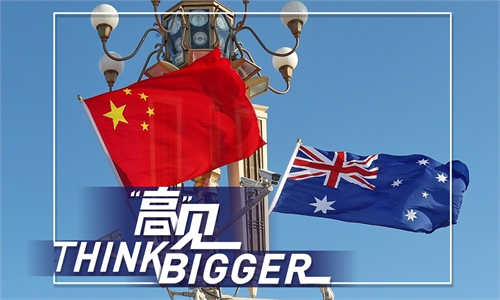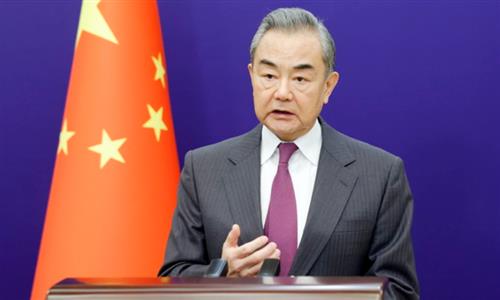
Sydney Opera House in Australia. Photo: VCG
Editor's Note:Chinese Foreign Minister Wang Yi kicked off his visit to New Zealand and Australia on Sunday. In Australia, he will hold the seventh China-Australia Foreign and Strategic Dialogue with Australian Foreign Minister Penny Wong. What kind of signal does this visit show? In which areas do the two countries have room for further cooperation? What influence does the US now have over Australia's China policy? Daryl Guppy (Guppy), former national board member of the Australia China Business Council, shared his insights with Global Times (GT) reporters Wang Zixuan and Xing Xiaojing.
GT: After his previous visit to Australia seven years ago, Chinese foreign minister Wang Yi is paying an official visit to Australia this week. What kind of signal does this visit show? What are your expectations for this visit?
Guppy: Seven years is a long time, too long. Foreign Minister Wang Yi is always welcome in Australia. It is a signal that China-Australia relations are normalizing to the extent that we are talking face-to-face, and that's very important. The cooling of relations between Australia and China had a substantial impact on the Australian economy. It destroyed many long-term relationships between Australia and China on a business level.
Australian Foreign Minister Penny Wong has said that "Australia is working to stabilize relations with China." This means that there is more diplomacy at play. Now, there is less scolding of China, which is what used to happen several years ago. A more polite and diplomatic conversation is taking place, and this means that many more things are achievable. Some of the difficulties that the China-Australia relationship had in the past can be overcome. We can move forward in new directions with what Wang is bringing to the table.
GT: In your view, in which areas do the two countries have room for further cooperation? Do you have any suggestions for our future relations?
Guppy: The fact that Wang is coming to Australia is a breakthrough in the relationship. We are very hopeful that this face-to-face discussion will help improve China-Australia relations and will open up our friendship again, where people will be able to travel more freely between both countries and we can develop a deeper understanding of each other.
For instance, they will talk about the cooperation where we disagree in the national interest. That's what is to be expected, but what's more important is what develops after that, like how we can address and resolve some of the major issues related to trade, security, and also China's place in the world. That's what's going to be important in this meeting.
GT: On March 5, former Australian prime minister Paul Keating accused Australia of "buying into American hegemony in the region" as he criticized the current government's China policy. What do you think of the influence the US has on Australia's China policy and its relations with China?
Guppy: What Keating said is really of no surprise. The US has exerted and continued to exert a tremendous level of influence on Australian foreign policy. Australian politicians like to say that we're independent. But the fact is Australia is a sub-imperial power. In other words, its foreign policy is very much consistent with that of the US. Although it does not always follow the lead of the US, most of the time it does. This is a concern. And Keating is perhaps one of the voices of that concern.
The relationship between Australia and America, particularly in terms of defense and security, is becoming too strong and blinding Australia to the genuine situation that exists, particularly in relation to activity in the South China Sea. Australia is very much following what the Americans are doing rather than developing its own set of relationships.
GT: The West has accused China of trying to change the order. Why does the West have such a misunderstanding of China? And why does the current Western order need to change?
Guppy: The West's misconception of China is because it rejects China's advances. Its interpretations rest on many mythological understandings of China and misunderstandings of China. Essentially, America assumes China would act in the same way as America does, ignoring the arc of history, which shows that China is not an expansionist power. China is not interested in global hegemony in the same way the US is. The US refuses to understand the cultural differences between what drives China's relationship with the world and how the West traditionally sees China's relationship with the world. That's the first issue.
The second issue is that America wishes to retain primacy. It doesn't recognize China's legitimate interests within the region. That's really important, because when it doesn't recognize the legitimacy of China's aims, then it says China has no right to play within the global rules-based order. The global rules-based order was established by the US, but whenever the rules don't suit the US, it chooses to ignore the rules. That is what we're seeing with what's happening in Gaza at the moment.
So it's very important for China's economic scale and development to play a role in the rules that determine global economic and trade relationships. China has been excluded from those forms, and that's not right.
GT: The US, Australia and the UK are considering cooperating with Japan in defense technology within the AUKUS framework. Some observers believe this is aimed at China. What's your take?
Guppy: There is no question that AUKUS is deliberately directed toward containing China. Now, there are two ways in which this attempt is made. The first is militarily, with continued freedom of navigation exercises in the South China Sea being a part of that. As for AUKUS, it is perhaps a little bit of a paper tiger, as the primary concept of AUKUS is nuclear submarine, which won't be delivered for another 10, 15 or 20 years.
The other attempt to contain China is by trying to hold China back from its development. We see this with US sanctions on chips, high-tech development and electric vehicles. All of these are not designed to promote fair competition, but rather to prevent and constrain China's economic development. Despite American claims to the contrary, this is the reality.
GT: Australia and ASEAN have recently issued a joint declaration encouraging all countries to avoid any unilateral actions that endanger peace, security and stability in the South China Sea. This is seen as an attempt by Australia to distance itself from the tensions in the South China Sea. What's your view?
Guppy: It's important to remember that the ASEAN-Australia summit removed the mention of Taiwan and softened the words related to the South China Sea in the final declaration. Australia is working toward reducing conflict, but in reality, the continued "freedom of navigation" exercises vigorously increase the tensions within the region.
It reflects the idea that China does not have legitimate interests in these areas. So Australia may be playing more diplomatically in that area, and that's good to see. It means that there is an increased probability in this foreign and strategic dialogue that we can set up lines of communication.
GT: Apart from the potential problems mentioned above in China-Australia relations, are there other obstacles? If so, how do you suggest we overcome them?
Guppy: The problem has come down to a core lack of understanding. The West generally has a very poor understanding of what is happening in China. We can overcome this in two ways. The first way is by opening our universities to more effective study of China. We shouldn't make it seem like a security risk if a student wants to undertake studies related to China. The second way is to encourage tourism and face-to-face relationships. It's much more difficult to hold on to misunderstandings when you start talking to people from the other countries. They are the key ways in which we can improve the relationship. It has to move beyond pure economic relationships, and focus on people-to-people relationships.


